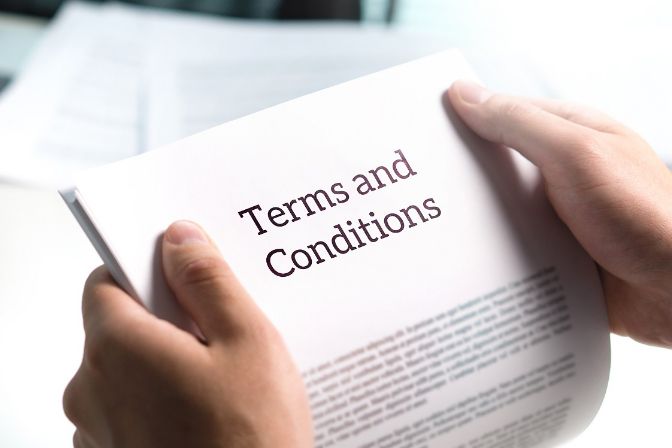
Business, General Tips, Your Event Career
As an event planner, your contract is one of the most important documents in your business. As such, it’s not enough to just have a good idea… You need to have it legally protected! Writing a solid event planning contract helps ensure that everyone involved understands their roles and responsibilities, as well as what they can expect from the event itself.
But there are certain mistakes to avoid when writing an event planning contract. Now, we’re warning you upfront: if you accidentally make any of these mistakes, it could have serious consequences for both you and your client.
So, let’s get started!
First Thing’s First: What are the 7 Requirements of a Contract?
Before we reveal what you shouldn’t do, let’s first take a look at the 7 things you do need to include in any event planning contract:
- Offer & Acceptance – A contract must include both an offer from one party and its acceptance by the other.
- Competent Parties – Both parties involved in a contract must be competent and of legal age. Furthermore, they must also be in the right mental and emotional state to enter into a contract.
- Legality – Any contract must be based on a legal agreement and not involve any illegal activities.
- Objective – The purpose of the contract must be clearly stated and not violate any laws or regulations.
- Description – The contract must include a clear description of the services to be provided, including the details and cost.
- Terms & Conditions – All possible terms and conditions must be detailed in the contract.
- Signature – The contract must be signed and dated by both parties in order to make it valid.
PRO TIP: Here are some more best practices when it comes to writing an event planning contract!
20 of the WORST Mistakes to Avoid when Writing Your Event Planning Contract
Okay, now you have a better idea of the 7 requirements of an event planning contract. So, now let’s dive into the mistakes you don’t want to make!
Mistake #1: Not Defining Your Event Planning Services & Pricing
This is definitely one of the biggest (and most common) mistakes made when writing an event planning contract. You need to clearly define what is and isn’t included in the price! This way, there will be no surprises when it comes time to draw up the invoice… And your client won’t have any reason to avoid paying you!
Mistake #2: Not Specifying Event Details & Payment Terms
It’s also important to include details about the event itself, as well as payment terms and conditions. This should include things like the:
- Date and time
- Venue setup
- Catering services
- Audio visual requirements, etc.
It’s also important to make sure that you specify when and how the client will pay for your services!
Mistake #3: Not Including a Cancellation Clause
No one likes to think about cancellations. But the reality is, they happen. As such, it’s essential to include a cancellation clause in your contract.
This should outline the conditions under which either party may cancel the event, and what the expected financial repercussions will be if this occurs.
Mistake #4: Not Accounting for Any Other Relevant Clauses
Speaking of clauses, don’t forget to include any other relevant clauses as needed. This could include things like an indemnity clause, a limitation of liability clause, etc.
It’s also important to ensure that the contract is written in compliance with all applicable laws and regulations.
PRO TIP: Every event planning contract needs these 8 clauses in them!
Mistake #5: Not Specifying Your Liability
No matter how much you plan for, there’s always a chance of something going wrong. As such, it’s important to specify your liability in the contract. So, make sure that any potential risks are outlined in the contract – as well as who is responsible for any potential damages.
Mistake #6: Not Double-Checking Dates & Details
Another common mistake when writing an event planning contract is forgetting to double-check all dates and details BEFORE sending the contract. The problem is, when you fail to do this, it can lead to confusion and even disputes down the line.
So, make sure you double-check everything before sending the contract! All the information provided needs to be accurate and up-to-date.
Mistake #7: Not Including Time Frames
Time frames are also really important when it comes to event planning contracts. Particularly, because they help ensure that both parties meet their obligations in a timely manner.
This holds you accountable in the sense that you must meet the deadlines stipulated in the contract – and your client will be expecting you to do so. In the same breath, it also holds the client equally accountable because they must fulfill their payment obligations within the stipulated time frame.
So, make sure you include time frames for the completion of each task or deliverable!
Mistake #8: Writing Your Event Planning Contract Using a Template You Found on the Internet
Okay, so here’s the thing… There’s nothing technically wrong with referring to a template – especially if you’re brand-new to writing a contract. However, it’s important to note that every event planning contract is unique.
Therefore, your contract should be tailored to each individual client and their specific needs. This means that you should avoid copy/pasting the same contract over and over again. Instead, make sure to craft each one carefully. Take into account the particularities of each event, client, and agreement.
Doing this will help ensure that you’re providing your clients with a quality contract – and one that is legally binding.
Mistake #9: Writing Your Contract in “Legalese”
As a good rule of thumb, avoid “legalese” whenever possible.
When writing your event planning contract, assume that your client isn’t familiar with archaic, legal jargon. Instead, strive to write in plain language that is easy to understand. This will make it easier for your client – and you! – to read through.
Not to mention, it’ll reduce the likelihood of there being any misunderstandings – which will come back to bite you down the road (we promise).
Mistake #10: Your Contract Sounds Like it Swallowed a Thesaurus
While we’re on the topic of making your event planning contract easy to read, remember to keep it simple! Too many long words and phrases can make it difficult for people to understand.
We get that you want your contract to look professional – but remember that less is more. Stick to words and sentences your clients will actually understand, as opposed to making them feel like they need a dictionary to read it.
The bottom line is, don’t let your contract be bogged down by complex sentences and overly-formal language. It should be easy to read and understand!
Mistake #11: Not Actually Calling it a Contract
It may seem silly, but this is an all-too-common mistake. Don’t forget to actually call your document a contract – because, well, that’s what it is.
It’s not just an agreement or terms of service. And by not calling a contract what it is, you’re essentially leaving yourself open to any potential misunderstandings and disputes.
So, don’t forget the basics: Call it a contract! Furthermore, make sure the language used in the document reflects that.
Mistake #12: There’s No Definition Clause (or It’s Lacking Clarity)
The definition clause is an important part of any contract. It’s essentially like a glossary – and it defines the key terms used in the contract.
This is important because it helps ensure that everyone involved understands what each term means (or should mean). In turn, this can help to prevent any potential misinterpretations and disagreements.
Therefore, make sure that your definition clause is clear and concise – and that it covers all the important terms in your event planning contract!
Mistake #13: There’s Nothing There in the Event of a Dispute
This is an especially important one! You need to make sure that you include a dispute resolution clause in your contract. This will outline what should happen if a dispute arises between you and your client.
Therefore, make sure that this clause is comprehensive and clear. It should detail the specific steps that should be taken in the event of a dispute.
By doing this, you’ll be protecting yourself – and your client – from any potential problems down the road.
PRO TIP: Learn more about the importance of a well-written contract in a time of crisis!
Mistake #14: You’ve Omitted Verbal Agreements from Your Event Planning Contract
We can’t make this clear enough: verbal agreements are NOT legally binding! Therefore, it’s important to make sure that you include all verbal agreements in your event planning contract. Get EVERYTHING in writing!
If you and your client discussed something in-person or over the phone, it needs to be written down and included in the contract. Otherwise, those verbal agreements won’t be legally enforceable.
Also, while we’re on the topic, this also applies to any future amendments as well. For example, down the line, you and your client may agree to something new that isn’t reflected in the original contract. At that point, you’ll either want to amend the original contract to show these new changes – or you’ll want to create a separate written agreement that both parties sign.
Again, it’s all about making sure everything is in writing!
Mistake #15: You’re Getting Way too Sidetracked by Research
If this is your first time writing an event planning contract, you may find yourself getting overly caught up in research. You might be thinking, “How can I make sure that my contract is legally binding and that it covers all the necessary bases?”
It’s important to do your due diligence, of course! But don’t get too caught up in the research process. Remember, this is your event planning contract – and you know it better than anyone else does.
Mistake #16: Assuming the Other Party’s Terms without Clarification
When writing your event planning contract, you need to make sure that you’re both on the same page before signing anything. In other words, don’t just assume that the other party’s terms are the same as yours.
Instead, make sure that you clarify any discrepancies before moving forward. Otherwise, this could lead to potential misunderstandings and disputes down the line.
Mistake #17: Failing to Explain Payment Terms
As an event planner, getting paid is obviously a priority. Therefore, make sure that you include clear payment terms in your event planning contract.
For example, do you require a deposit before beginning the job? How much is the total payment, and how will it be broken down into installments (if applicable)? When is the final payment due?
Also, make sure that you specify what forms of payment you accept. For instance, do you only take cash or credit cards?
By including these payment terms in your contract, you’ll be ensuring that there’s no confusion about when and how you get paid.
Mistake #18: Not Reviewing The Contract as a Whole Before Sending It Out
To be frank, this is a rookie mistake… And one that can cost you in more ways than one!
For starters, if your client receives a contract chalked full of spelling mistakes and grammar errors, it reflects poorly on you and your business. Secondly, you may end up leaving out important details, getting certain details wrong, or not properly explaining certain clauses. Obviously, this can lead to disputes down the line.
So, make sure you review the contract as a whole before sending it to the client! This will help ensure that all the details are accurate – and that everything has been included.
Mistake #19: Not Getting Your Event Planning Contract Notarized
If you’re serious about protecting yourself and your business (and we know you are), then it’s important to get your contract notarized. What this essentially means is that a notary public will review and sign off on the document. Thus, they will be verifying that it’s indeed legally binding.
Mistake #20: Not Seeking Professional Legal Advice
Ultimately, writing an event planning contract can be tricky. As such, it’s always a good idea to seek the help of a professional lawyer before signing any contract. This way, you can be sure that everything is written in accordance with the law – and you won’t have to worry about any potential legal issues down the line!
Frequently Asked Questions
Q: What should not be included in a contract?
A: Generally, it’s best to avoid including any terms or conditions that are:
- Illegal;
- Overly vague;
- Unconstitutional;
- Or discriminatory.
Additionally, you should avoid including any information that may be considered private or confidential.
Q: How long should an event planning contract be?
A: This really depends on the specific event and its requirements. Generally, however, event planning contracts should be kept as concise as possible in order to avoid confusion. On average, these contracts are usually no longer than two to four pages.
Q: What are 3 things that can cause a contract to be void?
A: When a contract becomes void, that means it is no longer legally binding. There are many reasons why a contract can be voided – but three of the most common ones are:
- Misrepresentation of facts and/or fraud;
- Illegal activity;
- And the presence of a mutual mistake.
Q: What are common mistakes in contracts when writing one for the first time?
A: Some common mistakes when writing a contract for the first time include:
- Failing to specify payment terms;
- Failing to include all necessary information, clauses, etc. in the contract;
- Not reviewing the contract as a whole before sending it out;
- Not getting the contract notarized;
- And not seeking professional legal advice.
Q: What are some words to avoid in contracts altogether?
A: When writing a contract, it’s important to use precise and clear language. As such, try to avoid using words that have multiple meanings or are overly vague. Additionally, you should also avoid using words that may be considered prejudicial, discriminatory, and/or inappropriate.
Final Thoughts
Writing an event planning contract doesn’t have to be difficult – as long as you know what mistakes to avoid. By following the advice in this article, you can ensure that your contracts are legally binding and won’t lead to any issues down the line!
Do you have any questions about writing event planning contracts? Maybe some DO’s or DON’Ts we didn’t mention in this article? Let us know in the comments below!
Good luck, planners, and thanks for reading!










